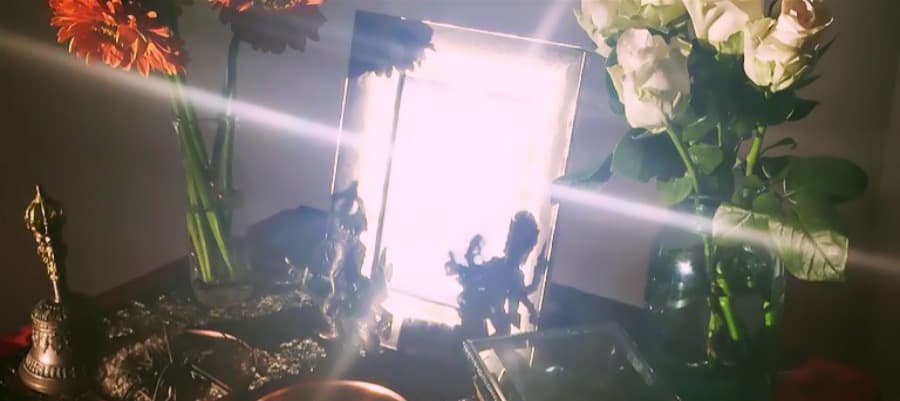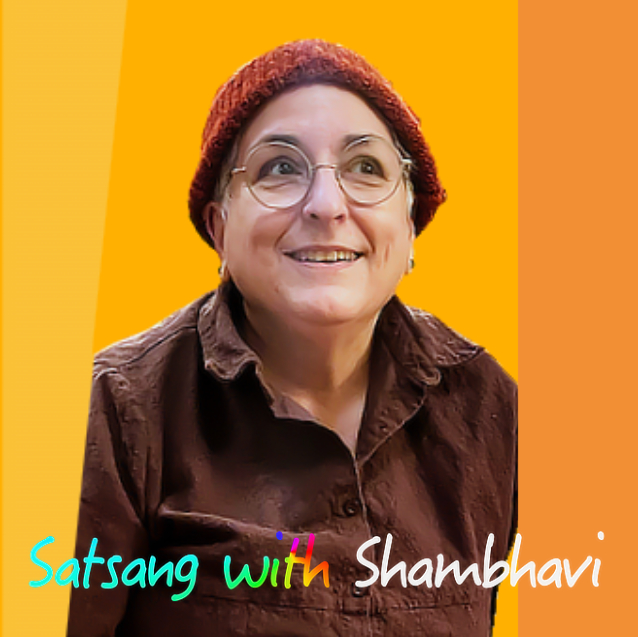When we exaggerate spiritual accomplishment, we lose the magic. Get real to discover the real fruits of practice. A podcast from Satsang with Shambhavi
SHAMBHAVI
I wanted to tell you about a conversation I had today with somebody. Some of you know the story of an experience that I had the first time I went to the ashram in Varanasi, Ma’s ashram in Varanasi.
And that story got told by someone I'm friendly with in a little newsletter he puts out. He asked if he could do that, and I said, okay, and then unbeknownst to me, that little newsletter circulated to the Ma ashrams in India, and then also unbeknown to me—I just found this out like, I don't know, maybe six months ago—a story began to coagulate around this.
So that how it got back to me, was that a newscaster in Southern India somewhere—I think in Tamil Nadu, I'm not sure exactly—told a story of a Western woman who traveled all over India, going from guru to guru, never meeting the master until she went to the ashram in Varanasi and had this spectacular experience of shaktipat on the balcony in Varanasi.
So apparently, like it’s become this thing. Only a little bit of that is true. But I did not go all over India looking for a master.
Anyway, so then today somebody writes to me and says—somebody who gives satsang—and says they gave satsang, and they talked about that experience that I had that they somehow found out about. Maybe from the website because I eventually did write about it. They sent me a link to listen to this.
And so I listened to it. And there was about 15% of a kernel of truth there, and all the rest of it was just I don't even know where it came from.
So [laughter] it just reminded me of how stories about spiritual accomplishment get told and retold, and how the weird part of it is that they get overblown.
But then the magic gets lost.
And I was just thinking as I was sitting there that the magic is absolutely real, but we have to be real to experience the magic. It's kind of interesting.
I was always pretty eyebrow raise-y about a lot of the stories I've heard, recognizing that the people that told them had an ego investment in telling stories about their own teachers or other teachers.
“So and so is totally realized.” “Everybody is the same, etc., etc.”
A lot of exaggeration.
And yet there is something absolutely spectacular and magical and beyond exaggeration about the nature of this reality and what one can get into touch with as a practitioner.
I have no idea why I've had the things happen that have happened to me, but I do know that I've always practiced in a very sober way. I don't mean joyless or without laughter. Of course, that's not true.
But, I mean, I've never been unwilling to throw out the stuff that I thought was probably exaggerated or unreal or serving someone's lineage just to prop it up or serving someone's ego just to prop it up including my own.
So it seems like the path to the extraordinary is to be as utterly ordinary and sober as you possibly can [laughter]. At least that's something I've learned.
So I told this fellow—we were writing on Facebook and I said, yeah, you got a little bit of it right. And I don't really mind. You told a good story. He had a certain purpose for telling the story in the way that he did. So I said, you got your point across. But here's what actually happened [laughter]. Kind of funny.
Anyway, I just wanted to share that because it just came into my mind while we were sitting there that the magic is real. I just kept hearing the magic is real. The magic is real. The magic is real. But the path is just barefoot and one step at a time.
STUDENT 1
How did they change your story and why?
SHAMBHAVI
This was the story he told: I was very intellectual. I have a PhD from Stanford. That little tidbit is true. And I didn't believe in God. And according to him, my spiritual life started when I went to the ashram in Varanasi.
Actually, in truth, I'd already been practicing for 15 plus years, and my practice was anything but mired in intellectualism.
But he told it as if, he said, I had this experience of shakipat on the balcony at Ma’s ashram and my intellectual bubble was shattered.
[laughter] And so he was trying to tell some story about how spiritual grace can reach even hardened intellectuals.
STUDENT 2
He was just making you Ram Das, basically.
SHAMBHAVI
Yeah. I don't know what he was doing. It was sort of like I had not done any practice until that point. Yeah.
STUDENT 3
What was this experience? Can you talk about what happened? I've never heard of you talk about that.
SHAMBHAVI
There's an article on the website which I actually wrote because I didn't want it to get mis-told. But the article is called “How I met Anandamayi Ma” and what happened was that I went to Varanasi.
It was the first time I'd been to India, and a person who worked at the ashram directed me to go to this balcony on the second floor where Ma gave satsang when she was alive. And I basically went up a flight of steps, and the minute I set foot on the balcony had this pretty extraordinary experience of grace and the ubiquitousness of wisdom. And just like the sky just opening up and seeing all those wisdom virtues I talk about.
Through this experience is how I came to understand that wisdom is what everything is made of.
And it just went on for a long time, this experience, like I was very moved. I was just weeping and it would change my life. So if you want to read more of the details that you can look up on the website “How I met Anandamayi Ma.”
So it is an experience of what gets called shaktipat. But it was really so much more than that.
It was an encounter with the fundament of reality, what reality actually is. And I finally understood what God is.
I had been given a lot of clinical words to describe God when I was studying with my teachers: all knowing, all powerful, all this, all that. If that really was all God was, no one would really feel moved by God. They’re just sort of scientific attributes or something [laughter].
It was a direct encounter. And I previously to this had been having dreams where Ma came in my dreams and she was telling me directly that she was my guru and I didn't believe it. And I was very resistant because I thought it wasn't a good idea to have a dead guru. It was too much possibility of being in a state of fantasy which I didn't want to be in.
And then after that, I just had to like, acquiesce. Basically.
There's nothing I could do, even though I still occasionally find it slightly embarrassing to tell anyone that my guru isn't alive anymore, and that I never met her in the flesh.
Part of that is just my allergy to any kind of spiritual fantasy or bragging or anything like that. I'm still getting used to telling people about things that have happened to me, which still seem very extraordinary, that among them. But that's not the end of it.
And I've been really contemplating, as I think I mentioned in a different context a couple satsangs ago, how to let more of those experiences out in a healthy way. Because I do want people to feel and know the magic of these practices and the magic of reality and to know what is actually possible. Stay tuned.
There's a lot of people that will go around and tell you everything that ever happened to them, from the smallest little thing to whatever, and they manipulate students that way. They've been manipulated themselves. They don't understand the breadth of what could possibly happen. So they take some thing that's—not that it's unimportant, but it's not all that—and they blow it up into this huge thing.
And in that context, it's very hard for me personally to authorize myself by calling out my experiences or describing my experiences. I try to only mention my spiritual experiences when I feel it will be helpful to a student or students. I'm not going to go into this at any length, but I've had experiences, very esoteric experiences, directly related to Trika Shaivism.
And then occasionally someone will say that I'm not authorized to teach. I do have authorization to teach, but from a teacher I don't really care if I have authorization from. So I have like, ordinary authorization, but it really doesn't mean anything to me. Occasionally I'll just say that to get someone off my back.
But, the real authorization to me is from these more esoteric experiences, but it's very, very tricky to use them in that way. Very tricky on lots of different levels to keep everything honorable and with no hint of manipulation. Like, why would I need to claim anything? You know, I can just do what I'm doing and whoever likes it likes it. And whoever doesn't, doesn't.
That seems to me a much cleaner thing than going around saying what my authorizing experiences are. But at the same time, I want people to feel that there's this magic, that there's this possibility. I've let more out over the years than I used to, but just in a kind of quiet way among my own students.
STUDENT 3
I think it's just so helpful when teachers anchor what they're saying in their own experience somehow, and it brings it alive. And I really appreciate it when anyone does that, because otherwise, it's just abstractions and concepts. So thanks.
SHAMBHAVI
Yeah. You're welcome. I think that we're so disconnected from experience as a source of wisdom. And we don't realize that the people who founded these traditions, who actually had some accomplishment, they weren't just good students. They were just speaking from their experience, but we don't realize that somehow.
So our experience really is what authorizes us.
Not what we know out of a book or how well we're able to recite or regurgitate complicated philosophical spiritual stuff. It's not even in how much we adhere to one particular tradition’s way of describing something. It's adhering to our own experience and being absolutely in integrity with that.
And then, when that is happening and you have deep spiritual experience, you realize that every teacher who is operating from that place, is in essence, they're sort of adhering to forms, but they're also their own stream of vidya shakti in a way. Like all of them.
Even the ones that come from these very venerable lineages. There's very few people like that around that have that kind of original familiarity with the vidya shakti of their tradition or whatever, the wisdom itself. And when that happens, you get very idiosyncratic teachings, or at least ones that are very shaped by the creative persona of the teacher.
I’ve been extremely lucky to have come in contact with some teachers who the depth of their originality is just stunning.
And then they weren't doing anything like, so far out. They themselves, their own self conception was they were in a certain kind of lineage and teaching things their teachers had taught them that they had practiced.
But in their actual expression and how they brought the teachings to people, they were just enormously creative and original. And you could just feel the saturation of everything that they did with that direct, knowing that they had. I’ve been very lucky to have those examples in my life.
Sign up to receive email updates
Enter your name and email address below and I'll send you periodic updates about the podcast.


